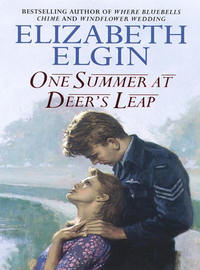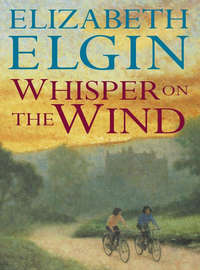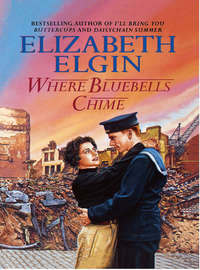
Полная версия
All the Sweet Promises
‘It’s wrong of me, but I wish I could be at Lady Mead, Goddy. It must be beautiful now, in Lincolnshire.’
‘Ah, yes.’ He clamped an empty pipe between his teeth. ‘I remember your christening. It was a May day just like now, and warm and sunny. The chapel at Lady Mead was full of flowers, and how you screamed and yelled. Nanny was pleased, I seem to recall. Said you’d cried the devil out of you, and that was good.’
‘Dear Nanny. She’s at Lady Mead, you know. The Air Force was very good. They didn’t throw us out entirely. Pa had all the good stuff stored in the Dower House when we had to leave, and Nanny’s there now, looking after it. She writes every week. But you must be very busy and I came here to ask a favour, a big favour. I hope you don’t mind?’
‘Of course I don’t. Just tell your old godfather, and if I can I’ll help. But what about a cup of tea, eh? My writer is a little wonder. Never seems to run out of rations, bless her. And last night she went to a do at the American Embassy and came back with a packet of chocolate cookies – er – biscuits, no less.’ He thumbed a bell-push on his desk, and a woman in naval uniform opened the door. ‘Leading Wren, this is Lucinda Bainbridge, and she’s in desperate need of a mug of tea. And do we – er – have a biscuit?’
‘Sir, you know we do, though how you got to know about them I can’t imagine.’
‘I want to be a Wren,’ Lucinda whispered when they were alone again. ‘That’s why I came – to ask you to help me. I ought to be doing more than I am. I – I had a terrible row at home this morning. I’ll have to go back and say I’m sorry, but I want to join up, truly I do. And not because of Mama,’ she finished breathlessly. ‘I really want to do something useful.’
‘I’m sure you do, but Kitty mustn’t ever know that I’d had a hand in it.’
‘Are you afraid of her? All right then, I’ll join the Waafs or the ATS. I don’t mind which, but I’ve got to do something, Goddy. Sometimes I feel so ashamed.’
A knock on the door announced the arrival of two white mugs of tea and an anchor-decorated plate on which lay, unbelievably, two large thickly coated chocolate biscuits.
‘Leading Wren, you’re an absolute marvel,’ the Admiral said.
‘Oh no, sir,’ she smiled, eyes bright with mischief. ‘It’s because I’m feeling so pleased about my leave chit.’
‘Your leave chit? Did I sign it?’
‘No sir, not yet. But you’re going to, aren’t you?’
‘Hussy,’ barked the Admiral to her retreating back. ‘She’s a good girl,’ he confided, offering the plate to Lucinda. ‘Her young man was taken prisoner at Dunkirk and not so long ago her father was badly hurt in the Clydeside blitz, but you’d never know it.’
‘There you are, Goddy. That’s what I mean. That’s why you’ve got to help. This war is affecting everybody but me, it seems. You will try to get me in quickly, won’t you? I can’t type or do anything useful that I can think of, but I learn quickly. There’s got to be something.’
‘Want a job here in the Admiralty, do you? Somewhere in London, near Charlie?’
‘Anything will do, though I’d rather go away, if you could manage it.’
‘Hmm. We’ll have to see. I don’t carry a lot of weight now, in spite of all my gold braid. Now a few years ago …’ His mind flew back with ease to the last war and an up-and-coming young officer on a smoke-belching dreadnought at Jutland. Now that had been one hell of a scrap. ‘Still, I’ll do my best for you, girlie.’
He discussed the matter later with his writer.
‘I’m afraid I’m not entirely au fait with the women’s side of things. Do we know anyone in Recruiting, Leading Wren?’
‘Is your goddaughter serious about joining up, sir?’
‘Very serious, it would seem.’
‘Then I think I know who’ll be able to help her. Oh, and sir, you’ll never believe this – it’s quite peculiar, really. It’s Rudolf Hess. There’s a strong buzz that he’s in Scotland. Have you heard anything?’
‘Hess? Here? Piffle and tommyrot, Leading Wren!’
Hitler’s right-hand man in Scotland? Whatever next? The Admiral dismissed the rumour without a second thought and concentrated on more important matters: his goddaughter’s immediate entry into the Women’s Royal Naval Service, no less.
Poor child. Her mother wasn’t the easiest person to live with, but joining up! Surely she’d have done better to marry young Charlie Bainbridge and settle down to starting a family. Been on the cards for ages, that wedding. Strange that Lucinda should not want to stay in London. It was a rum do, and no mistake.
He regarded his in-tray with a weary eye, then, sighing, picked up his pen again.
Jane awoke without effort, Missy’s cold nose on her cheek.
‘What is it, girl?’ Her eyes were wide in an instant. The bombers were coming back. Missy had heard their engines long before a human ear could pick up the first faint sound and had come to tell her.
‘Can you hear them, then?’ She pulled back the curtains and opened the windows wide, patting the seat beside her.
The sky was light to the east, streaks of red and gold piercing the grey. Birds were starting their morning singing, roused by the missel thrush in the pear tree. Below her, in the orchard, apple and pear and plum frothed pink and white with blossom, and over in Tingle’s Wood a sea of bluebells rose out of the morning mist.
It was all so normal, this May-morning canvas, but soon the bombers would return, stark silhouettes against a pale sky, reminding her that the war was real, setting the frightened pulse in her throat beating again.
She saw them before she heard them. Two Halifax bombers, wheels already down; two black nightbirds coming home to roost. She held her breath, listening. They had taken off with ordered precision; they would straggle home in ones and twos, their engines making a different sound in the thin morning air.
‘That’s the first of them, Missy.’
She reached into her pyjama jacket and hooked out the chain that hung around her neck. On it were her confirmation cross and the farthing Rob had given her soon after they met. It was bright and new, with the King’s head on one side and on the other a wren and the date, 1941. Rob said it was appropriate, since that was what she was going to be. ‘Keep it for luck, Jenny-love.’
She had done better than that and taken it to a jeweller to be plated and put into a mount so it could hang on her chain. He had been obliged to tell her, of course, that it was an offence to deface a coin of the realm, but he had done as she asked because women brought sentimental tokens to him every day of the week and, anyway, it was only a farthing. To Jane, though, it was precious and priceless and she wore it always. Now she held it in her hand with the cross, a silent pleading for Rob’s return.
The ninth bomber came out of a lightening sky at six o’clock exactly, and though she sat there for another hour, it was the last.
‘… and three of our aircraft have failed to return,’ the man who read the news would intone on the midday bulletin. Were they just words he was reading, or did he realize that three aircraft meant twenty-one crew, and countless women waiting anxiously for the phone call that would tell them their man was safe – or the letter that would tell them he was not?
She began to dress, cold clumsy fingers fumbling with buttons. How soon before she could phone the aerodrome? Not quite yet. Crews had to be debriefed and they would have to eat, too. Yesterday morning it had been all right. Eleven bombers had taken off; eleven came home. But three crews not back yet – oh, please not Rob!
Long before the sun was making shadows, she was standing beside the phone box at the crossroads outside the village, willing the minutes away. Soon it would be half-past seven, and exactly at half-past seven she would ring the aerodrome.
She always used the public box when she phoned Rob. Police telephones were not to be used for private calls, said her mother. It was better that way, she supposed, though if things had been normal at home Rob could have phoned her there. Just a quick ‘Hullo, Jenny. Everything’s fine.’ And perhaps a whispered ‘I love you.’
But things weren’t normal at home because her parents had said she must not meet Rob. Her parents were old and had forgotten, if ever they had known, what it was like to love someone as she loved Rob. And she wasn’t waiting any longer, damn it.
Impatiently she wrenched open the door and, taking the pennies from her pocket, picked up the receiver with a hand that shook.
‘Number, please?’ The switchboard answered quickly and it seemed like a good omen.
‘Can I have 220, please?’ She arranged her pennies in front of her.
‘Just a minute, Jane.’ This morning it must be Ruth on duty. Ruth knew everybody’s voice, even when they had a cold. ‘Have two pennies ready.’ The coins clinked into the slot. ‘Press button A. There you are, now …’
Jane pressed hard, the pennies fell with a clatter and a voice said, ‘Fenton Bishop 220.’ It was a Scottish voice and it gave her comfort.
‘Can I have the aircrew mess?’ she whispered, stiff-lipped. Her hand was wet and she gripped the receiver tightly, thinking back to the night of the February dance and how the telephone was fixed to the wall beside the door.
She took a deep breath. In just a few seconds Rob would be talking to her and it would be all right. It would.
When she asked for Sergeant MacDonald there was a pause, then the man on the other end of the line told her to wait. She had thought she would hear him calling Rob’s name but instead he hissed, ‘It’s Mac’s girl.’
The background noises stopped and she knew he had put his hand over the mouthpiece. She closed her eyes tightly. She felt very sick. She wanted to put the phone down and pretend it wasn’t happening but the noises came back and a different voice said, ‘Sergeant MacDonald isn’t here at the moment. Could you phone back later?’
‘Has he gone out?’ Panic had her now; ice-cold, screaming panic. ‘Has he left the camp?’
‘Well – no.’
‘Then where is he?’
‘I’m not sure.’ He was prevaricating but his voice was kind; too kind. She took another breath then let it go before she asked, ‘When shall I phone?’ She was shaking and her mouth had filled with saliva.
‘Look, do you think you could leave it until tomorrow? Or maybe you could get in touch with the Adjutant’s office, or the padre?’
She knew what he was trying to tell her, and tomorrow wouldn’t do. ‘He was flying last night, wasn’t he?’ she made herself ask it.
‘Yes, love, he was.’
He seemed reluctant to talk to her, but probably this man was aircrew, too. Perhaps talking to her about Rob made him feel that someone was dancing on his own grave. She whispered, ‘Please tell me.’
‘Sergeant MacDonald isn’t back yet.’ The words came in a rush. ‘He’s – he’s overdue, but don’t get upset. He could have ditched or landed down south somewhere. Try not to worry.’
A sudden hatred came over her; a cold, bitter hating of everything that lived and breathed. She wanted to hurt the man who had told her Rob hadn’t come back, but he had tried to be kind and anyway she couldn’t think clearly. There was a noise in her head that was making her dizzy so she whispered, ‘Thank you,’ and put the receiver down. Imagine, she’d thanked him for telling her Rob was missing! Clasping her arms over her stomach, she tried to stop the writhing inside her. O God, God, God! Why did you let this happen?
She did not remember going home. She’d pushed her bicycle most of the way before she collected enough sense to get on and ride it.
When she walked into the kitchen her mother looked up and said, ‘Where on earth have you been at this hour?’
Jane looked at her and at her father and hated them, too. They were old. They had been married for more years than she and Rob had lived. Why weren’t they dead, like Rob? He wasn’t coming back; she knew it.
Her father put down his paper. ‘Is anything wrong, Jane?’
Wrong? Something had just kicked the breath out of her body but no, nothing was wrong.
She needed to weep, but there was a pain in her throat and it was stopping the tears, so she laughed instead. She stood there and laughed until she shook. There wasn’t anything else to do but laugh.
She heard her mother say, ‘Stop her, Richard. She’s hysterical,’ and her father shouted ‘Jane!’ and took hold of her shoulders, but she went on laughing.
His hand on her cheek hurt. He slapped her hard and it made her head jerk back. She stopped in the middle of a scream and the breath left her body with a groan. It was the first time her father had hit her and he looked upset, but suddenly she was very calm and her voice was steady as she said, ‘I’m sorry. I shouldn’t have done that, but the man I’ve been going out with is missing. He was on ops last night and he hasn’t come back.’
It didn’t sound like her voice. It was as if the words were coming from inside her and someone else was speaking them.
Her mother covered her mouth with her hand and her face went pale. Jane was glad about that. She wanted her to be hurt, and her father too. If only because they were alive, she wanted it.
‘You used to pretend he didn’t exist, didn’t you?’ came the voice from inside her. ‘Well, he probably doesn’t now. Are you satisfied?’
She wouldn’t cry. Not in front of them. She closed the door behind her and walked upstairs to her room. Her face was chalk-white in the mirror and her eyes were large and wild. She said, ‘He’s dead. Overdue means missing and missing means dead. They don’t come back.’
She took his photograph from beneath the lining paper in her drawer and looked at it and tried again to cry. She would have given anything to weep until she was sick, but the pain was still there to stop her. She slumped down on to the bed. She didn’t know if she was rocking or if it was the room.
The door latch clicked and her father stood there. He looked so utterly miserable that she tried to feel sorry for him but she could not. She needed the whole world to be miserable.
‘Would it help to talk about it?’ he said.
When she was little, she always talked to him. Once, she had loved her father very much.
‘His name was Rob.’ The real Jane was speaking now and every word was a stab of pain. ‘I never told you that, did I? I don’t know a lot about him either, but it doesn’t matter now, does it? He lived in Glasgow but I’m not sure where. His father’s been dead a long time and he has – had – two brothers.’ Her father put out his hand but she pulled away. ‘I loved him very much. He was so young and it wasn’t his war. It’s your fault, yours and Mother’s. It’s your generation should be getting killed, not ours!’
Richard Kendal nodded, his eyes bright with pain. ‘Perhaps you’re right. We saw it coming and we did nothing.’ He walked over to the window. ‘Are you all right?’ he asked without looking at her. ‘Mother said she thought you haven’t been looking too good lately – a bit peaky.’
She knew what he was trying to say. They thought she might be having a baby, and if she really wanted to hurt them she could tell them she might be. But all the fight had gone out of her and she was afraid. Not of having Rob’s child, but of having it without him. But Rob had said it wouldn’t happen.
‘I’m all right, Dad. Don’t worry.’ She saw kindness in his face and compassion, and she whispered, ‘I did love him so. Don’t blame us. There was so little time.’
He held out his arms then, and because she hurt so much, because she wanted to be a little girl again, she went to him and the tears came.
It was good to weep. She wept until there was nothing inside her but low, gasping sobs and her body was limp.
Her father rocked her in his arms, just as he had done when she was little, and when her mother came in with a cup of hot milk and one of her soothing tablets, she swallowed it obediently, a child again.
‘There now. It’s going to be all right.’ Her father held her tightly until her eyes began to close and from far away she heard her mother pick up the cup and saucer.
‘I think she’s asleep now. When she wakes, don’t tell her the letter has come. Leave it for a while.’
So it was here, the OHMS envelope she had dreaded. Her call-up papers had come and she must go away.
Oh, Rob, I have to leave you …
Конец ознакомительного фрагмента.
Текст предоставлен ООО «ЛитРес».
Прочитайте эту книгу целиком, купив полную легальную версию на ЛитРес.
Безопасно оплатить книгу можно банковской картой Visa, MasterCard, Maestro, со счета мобильного телефона, с платежного терминала, в салоне МТС или Связной, через PayPal, WebMoney, Яндекс.Деньги, QIWI Кошелек, бонусными картами или другим удобным Вам способом.







